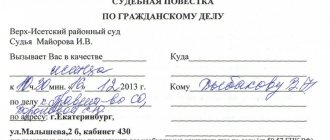In what cases can you refuse previously given testimony?
Strictly speaking, formally, there is no such thing as “refusal of previously given testimony.” Testimony has already been given and recorded in the interrogation protocol. In the context of the topic raised, “refusal of testimony” should be understood as a statement made by a witness or accused that the testimony previously given by him is invalid for one reason or another.
However, this is all theory. In practice, it is extremely difficult to “cancel” one’s own testimony
Even if the testimony during the investigation was given under pressure, it will not be possible to simply refuse it in court. Unfounded statements about pressure exerted by operatives or investigators will not be taken into account. As practice shows, if there is no objective evidence of undue influence, then refusing one’s own testimony in court will have no consequences.
In this regard, practicing lawyers advise “making waves” about illegal pressure during the investigation, without waiting for the case to go to court and be sure to apply for new testimony.
The right of the defendant not to testify against himself
Speaking about the rights of participants in criminal proceedings, one cannot fail to note, perhaps, one of the fundamental rights, which is enshrined in Part 1 of Article 51 of the Constitution of the Russian Federation.
Namely, “no one is obliged to testify against himself, his spouse and close relatives, whose circle is determined by federal law.”
At the same time, in accordance with the provisions of Part 3 of Article 56 of the Constitution of the Russian Federation, this right is not subject to limitation.
However, the whole question is whether the provisions of parts 1 and 2 of Art. 273 of the Code of Criminal Procedure of the Russian Federation, according to which “the judicial investigation begins with the presentation of the charge brought against the defendant by the state prosecutor, and in criminal cases of private prosecution - with the presentation of the statement by the private prosecutor.
The presiding judge asks the defendant whether he understands the charge, whether he pleads guilty, and whether he or his defense attorney wishes to express his attitude to the charge.”
Thus, we see that in fact Art. 273 of the Code of Criminal Procedure of the Russian Federation imposes on the defendant the obligation to testify regarding the charge brought against him, namely, to plead guilty or not, but does not contain provisions obliging the court to find out from the defendant whether he wishes to testify by admitting or not admitting guilt in the charge brought against him , as well as explain to him the right to refuse to testify against himself by admitting or not admitting guilt.
How does the application of Art. 273 of the Code of Criminal Procedure of the Russian Federation when courts consider criminal cases.
Let me give you one example.
“After the state prosecutor presented the charges against him to defendant N., the presiding judge asked the defendant whether he pleads guilty to the crime.
Defendant N. did not fully admit his guilt in the charge.
Only after these explanations from the defendant, the presiding officer explained to him the right to refuse to testify, provided for in Article 51 of the Constitution of the Russian Federation, the right to refuse to testify against oneself.
Defendant N. wished to testify at the end of the trial.”
In my opinion, in this case a situation arises in which the defendant, in principle, cannot answer the presiding officer’s question, other than to admit or not plead guilty, and does not imply the possibility of not speaking out on this matter (that is, not testifying), in contrast , for example, from the possibility of not expressing one’s attitude towards the accusation.
Therefore, the following question arises:
— do not the provisions of Art. 273 of the Code of Criminal Procedure of the Russian Federation, Part 1 of Article 51 of the Constitution of the Russian Federation in the part in which they impose on the defendant the obligation to testify regarding the charge brought against him, namely, to plead guilty or not, while they do not contain provisions obliging the court to find out from the defendant, wants whether he should testify by admitting or not admitting guilt in the charge brought against him, and also explain to him the right to refuse to testify against himself by admitting or not admitting guilt.
It also seems that the provisions of Art. 273 of the Code of Criminal Procedure of the Russian Federation violate the constitutional right of the accused (defendant) “not to testify against himself” and “to defend his rights and freedoms” by refusing to express his opinion regarding the admission or non-admission of his guilt in the charge brought against him.
PS: This article is not legal advice.
How to refuse previously given testimony?
In practice, the chances of “cancelling” previously given testimony may arise in the following cases:
— A witness in court discovered that the text of his testimony contained information that he did not speak about or the meaning of what was said during interrogation was significantly distorted
— The witness discovered that the signature in the interrogation protocol does not belong to him
— The accused (suspect) was interrogated during the investigation without a defense lawyer. In accordance with the Code of Criminal Procedure of the Russian Federation, testimony given without a lawyer has no legal force and cannot be used as evidence
— The testimony was given under pressure. In this case, they may be considered inadmissible evidence, however, in practice, it is extremely difficult to prove the facts of pressure.
Is it possible to refuse interrogation testimony and change the suspect’s testimony?
It is important to understand that everything said by the suspect will be documented and will have the force of evidence in the future.
At subsequent stages of the criminal process, the suspect's testimony will be checked and compared with other evidence. It should be remembered that everything said by the suspect during interrogation can subsequently be used against him in court, even if he subsequently refuses this testimony.
How to behave during interrogation? During interrogation, you should behave calmly, not irritably and respectfully towards the official. If a question is not clear, it is always better to clarify it or ask the investigator (interrogator) to formulate it somehow differently.
You should not provide information about circumstances that the investigator does not ask about, or share your conjectures and assumptions.
How can I change my testimony if I have already signed everything?
How to behave during interrogation But confusion only leads to an intensification of the psychological attack, and this is where the field of activity opens up for some unscrupulous law enforcement officers to organize various kinds of not entirely legal games and even provocations. They can simply say: “We know that you are a random person here.
It's your friend's fault. He has already admitted everything. You’ll tell everything about him and go home.”
Protect yourself - without intermediaries
Important: If the investigator did not allow the lawyer to interrogate the witness, it is recommended that the witness submit to the investigator a previously prepared application addressed to the investigator for the lawyer’s admission to the interrogation, and a copy of the certificate of the right to practice law and the lawyer’s warrant must be attached to the application. Tactics of relations with law enforcement agencies 161 It is important for the Criminal Code that the decision to close a criminal case can be appealed to a higher prosecutor (Article 236), as well as in court (Article 236-5).
You will find a template for a complaint against a decision to close a criminal case in Appendix No. 6. The prosecutor's office (both district and higher, city) is obliged to consider the relevant complaint and provide you with a reasoned response within three days (Art.
235). 9.
Refusal of previously given testimony
The opinions and assumptions of the suspect, communicated during interrogation, are an integral part of his testimony and are subject to mandatory verification.8.
The subject of the suspect's testimony is most often limited to the circumstances related to the involvement of the person as a suspect; the initiation of a criminal case against him, the grounds for his detention, the grounds for choosing a preventive measure in relation to him (Part.
1 tbsp. 46 Code of Criminal Procedure).
However, the subject of the suspect’s testimony may include any other circumstances that are subject to proof in a criminal case, including information about the relationship of the suspect with other participants in the criminal process, about circumstances that are important for the correct verification and assessment of his testimony, and other evidence collected according to his cause.9.
How can I change my testimony if I signed everything?
The right to protection and qualified assistance is guaranteed by the Constitution of the Russian Federation. Before the interrogation begins, the suspect has the right to consult with his lawyer; this communication is not limited in time.
During the interrogation, the suspect has the right to use his own notes, so you can come with a prepared text of the testimony. You should always prepare for interrogation in advance, after consulting with a lawyer who will help you most accurately formulate the information presented.
Some features of interrogation of a suspect Interrogation cannot last continuously for more than 4 hours. Interrogation at night is not permitted, except in urgent cases.
If a suspect is detained on suspicion of committing a crime, he must be interrogated no later than 24 hours from the moment of his actual detention.
Article 76. Testimony of the suspect
If the suspect agrees to testify, he must be warned that his testimony can be used as evidence, including if he subsequently refuses this testimony, with the exception of the case provided for in paragraph 1 of Part 2 of Art. 75 Code of Criminal Procedure.
Considering that interrogation is one of the effective ways to verify the grounds for attracting a person as a suspect, the legislator establishes the obligation to interrogate such a person no later than 24 hours from the moment of his actual detention in the manner established by Art. 91 of the Code of Criminal Procedure (Part 2 of Article 46 of the Code of Criminal Procedure).
The person against whom a preventive measure has been chosen must be questioned immediately.11.
The main means of recording the testimony of a suspect is the protocol.
Is it possible to change the investigator's testimony before the trial?
The oral form of testimony ensures its direct perception during interrogation and reduces the likelihood of distortion of the relevant data contained in it.3. The source of evidence in relation to the testimony of a suspect is the person brought in as a suspect in a criminal case.4.
It is unacceptable to interrogate a suspect as a witness, since this is associated with a direct restriction of his right to defense, distorts the criminal procedural nature of the testimony coming from him (BVS USSR. 1974. No. 4. P. 25), and contradicts the provisions of Art. 51 of the Constitution.
The testimony of a person, although brought in as a suspect, but without sufficient grounds for this, will also be unacceptable (BVS RF. 1998. N 1. P. 12).5. Giving evidence is one of the effective ways to protect a suspect; it is the suspect’s right, not his responsibility.
Is it possible to change the testimony of the investigator?
- Let's fight racism together
- How to behave during interrogation
- If you are a witness in a criminal trial
- Interrogation by the police
- Aydin. Does a witness have the right to change his testimony during the investigation?
- Tactics of relations with law enforcement agencies
- 9. some procedural issues
- Some nuances of operational art
Let's fight racism together Psychological aspects, legal basis and tactics of relations with law enforcement agencies (a short guide-recommendation) First of all, it is necessary to remember that the psychological aspects of relations with law enforcement agencies are of great importance, because in many respects the psychological state of the person in contact with law enforcement officials organs, the result of these relationships depends.
Interrogation of a suspect. Advice from a lawyer when questioning a suspect
Interrogation of a suspect is the receipt and recording, in accordance with the procedure established by law, of the suspect’s testimony about facts known to him that are relevant to the criminal case. Interrogation of a suspect is possible only within the framework of a criminal case.
Basic rights of a suspect during interrogation:
Source: https://autostrahovka24.ru/mozhno-li-otkazatsya-ot-pokazanij-doprosa-i-izmenit-pokazaniya-podozrevaemomu/
Arbitrage practice
Contrary to popular belief, retracting your previously given testimony is not an easy task.
A change in testimony by a witness or victim in court and a statement that the testimony that he previously gave to the investigator does not correspond to reality will, with a 100% probability, result in the disclosure, at the request of the prosecutor, of the interrogation protocol from the case materials. After this, the witness will be asked why his testimony in court differs from those recorded in the protocol. And as practice shows, arguments such as “the investigator misunderstood me,” “the investigator wrote down the testimony incorrectly,” “I didn’t read what I signed,” etc. are not accepted in Russian courts.
Often such situations end with the witness then being prosecuted for perjury in court.
Still have questions about the topic of the article? Ask them through the online consultant form right now!
Refusal to testify: the right to silence, reasons for evasion, responsibility
Sometimes victims or witnesses prefer to remain silent during interrogation.
This information can have a significant impact on the overall investigation. Therefore, the law says that if a person refuses to talk about what happened, then he faces criminal punishment.
In what cases are people held accountable for concealing information about a crime and whether there are exceptions to the rules - we will tell you in our article.
Reasons for avoiding testifying
Sometimes the persons being interrogated can provide the smallest details about all the circumstances of the crime committed. But they are silent. Why is this happening?
Motives may be different:
- do not want to assist the investigation or judicial authorities;
- have malicious intent to hide the identity of the criminal;
- are afraid that the attacker will take revenge on them or their relatives;
- do not want to be drawn into conflict;
- they themselves are criminals and are afraid that they will find out about it, etc.
If you know the facts and circumstances of a crime, but you concealed them, then expect criminal punishment.
It is not important for the court why the citizen refused to provide information. By law, the witness and the victim are required to testify.
An exception is a person’s refusal to testify if he or his relatives have been threatened with death. However, law enforcement agencies did not take any action to protect witnesses. This situation will be considered as a forced measure and a mitigating circumstance.
You may refuse to testify if you have been threatened.
Who can refuse to testify?
In some cases, during interrogation, you are required to refuse to testify. In addition, if you tell about some circumstances of the crime, the information received will not be able to be used in court.
Therefore, the law establishes a list of persons who cannot report information that became known to them in the course of performing their official duties.
These include:
- judges or jurors - should not disclose information that they learned about from the case;
- lawyer - must refuse if he learned the information from people who turned to him for help or advice;
- priest - cannot divulge the words entrusted to him in confession;
- State Duma deputies or members of the Federation Council when exercising their powers;
- persons entitled to diplomatic immunity ;
- State representatives for human rights or protecting the interests of entrepreneurs.
This category of citizens does not face criminal liability. They can legally remain silent during interrogation.
Article 51 of the Criminal Code of the Russian Federation
There are exceptions to every rule. The Code of Criminal Procedure of the Russian Federation specifies the conditions under which a suspect or accused may not incriminate himself.
Refusal to testify and witnesses is also permitted. But this rule applies only to a limited circle of people. Thus, the witness may not give evidence that could harm himself, or may remain silent when it comes to his loved ones.
In Art. 5 of the Code of Criminal Procedure of the Russian Federation provides a clear list of these persons:
- spouses who are officially married;
- parents or adoptive parents;
- blood brothers and sisters;
- grandparents, grandchildren.
In relation to other people, the citizen will have to testify, otherwise he may be prosecuted.
The Constitution of the Russian Federation gives every citizen the right not to testify against himself.
Responsibility for refusal
If the victim or witness does not give his consent to provide evidence, he will be prosecuted under Art. 308 of the Criminal Code of the Russian Federation.
Refusal can be expressed in inaction or, conversely, in excessive manifestation of activity. For example, you can:
- make a statement and express your reluctance to discuss the incident;
- fail to appear when summoned by the investigator or to court.
If you withhold information during interrogation, you may be charged with giving false testimony under Art. 307 of the Criminal Code of the Russian Federation. Therefore, if you have the right not to testify, then you must clearly state this. It’s even better to write a statement that you refuse to testify against yourself or your loved ones.
Responsibility for refusal to testify is established by Art. 308 of the Criminal Code of the Russian Federation.
If you refuse to testify, you may be prosecuted and assigned:
- fine up to 40 thousand rubles;
- compulsory work up to 360 hours;
- correctional labor for up to 1 year;
- arrest up to 3 months.
As you can see, the punishment for such actions is not very severe. Therefore, some citizens do not agree to testify, even if they are obliged to tell everything.
Before questioning, you must be warned of the penalties for refusing to testify or providing false information.
Summons for interrogation
The investigator invites all witnesses and victims for questioning by sending a summons that states:
- FULL NAME. called;
- as who is called;
- surname of the investigator, inquiry officer or judge;
- number of the case under consideration;
- date, time and address of appearance for interrogation;
- responsibility is reflected in case of failure to appear for unexcusable reasons.
The summons will be delivered to you personally or sent by mail with notification.
After interrogation of all participants, they may be confronted if the testimony is contradictory. As a result:
- the testimony of each participant will be confirmed;
- one of them admits to false testimony;
- both will be caught providing false information.
During the confrontation, a protocol is drawn up, which reflects all the testimony of the participants in the process.
Summarize
If you or your loved ones are called to testify by law enforcement agencies, do not be afraid.
It is best to adhere to the following rules:
- go to the interrogation only with a lawyer who will not allow the presence of other persons;
- demand that no unauthorized persons not related to the case be present at the interrogation;
- Answers to the questions posed should only be given in writing, since during registration there will be time to think about possible answer options.
The main thing is to know your rights when giving explanations in the case and enlist the support of a lawyer.
An experienced lawyer will accompany you during the interrogation and will not allow your rights to be violated. If necessary, he will achieve guaranteed protection from law enforcement agencies in the event of threats from suspects or criminals.
Source: https://ugolovnichek.ru/otkaz-ot-dachi-pokazanij/otkaz-ot-dachi-pokazanij







